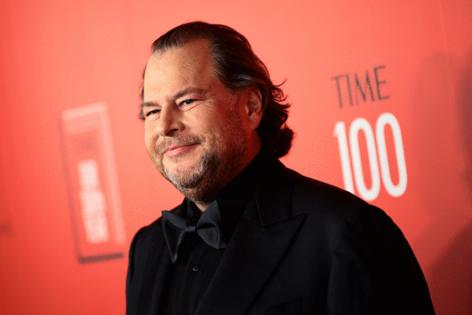Beth Kowitt: Marc Benioff has torched his do-good CEO image
Published in Business News
Marc Benioff, the chief executive officer and co-founder of Salesforce Inc., has spent north of $1 billion and decades trying to convince the public that he is the good kind of tech titan and that his enterprise software firm is the good kind of tech company.
So Benioff’s media blowup last week wasn’t just a little PR oopsie. It was a full-on torching of the carefully constructed narrative he’s spent so many years creating.
In an interview with The New York Times that should have been a benign, even boring, preview to the company’s Dreamforce conference in San Francisco last week, Benioff said that he was all for President Donald Trump sending the National Guard to the city.
Benioff’s comments were more than the general bootlicking that most tech CEOs have done to curry favor with Trump. But Benioff did some of that, too. “I think he’s doing a great job,” he said, even as he professed ignorance of what the president is actually doing. He said he had not followed closely the news about immigration raids, Trump’s gerrymandering push, the government shutdown or his attacks on the press. (He and his wife, Lynne, also own Time magazine.)
The whole thing was a complete self-own, but the fact that Benioff seemed not to realize it was happening in real time is a sign of just how out of touch he’s become. He underlined the point by maligning San Francisco as he flew there on his private jet from Hawaii, where he and his family have lived since the pandemic.
Big business is far from a beloved institution right now. Those who report having a “great deal” of trust in big tech is at a low, and just more than half of the public say they believe in CEOs to do what’s right. But rather than try to rehabilitate their image, tech CEOs in particular are coming off as craven and increasingly removed from their employees and customers.
Gone is the talk of business as a force for good or tech as a tool for making the world a better place. Instead, CEOs are warning that AI could take their workers’ jobs. They’re quashing their critics and slashing their workforces. They are taking their meetings from their mansions in Hawaii even as they demand employees return to the office.
Benioff’s reversal is especially stark because his do-gooderism had seemed sincere. He was the rare CEO willing to put himself at odds with other tech moguls, pushing for an increase in corporate taxes to fight homelessness in San Francisco and calling for social media to be regulated like cigarettes. He publicly advocated for a new kind of capitalism, one that doesn’t lead to “horrifying inequality.”
He also practiced the kind of corporate activism that’s disappeared during Trump 2.0. He canceled company events in Indiana after the state passed an anti-LGBTQ legislation and said he would move employees out of Texas after the passage of its anti-abortion law. He spent millions to close the gender pay gap at Salesforce.
But in his interview with the Times, his words and actions seem tailored to an audience of one: Trump. He spoke of the need to “re-fund” the San Francisco police force, even though it was never defunded and crime in the city is at its lowest level in decades. He claimed to have never been a progressive. Meanwhile, Salesforce is reportedly pitching ICE on using its AI for “talent acquisition.”
After intense blowback, Benioff pointed to his massive philanthropic activities in the city as a way to distract and deflect. Eventually he apologized in a post on X and said his comments were a mistake. At Dreamforce, he said he just wanted everyone to get along: “I want to put all of our political situations aside, all of our divisiveness, and just come together as one ohana,” a Hawaiian word meaning family and support system.
But Benioff is finding out that you cannot successfully play both sides, that “you can’t do ohana and say let’s bring in the troops,” as veteran tech journalist Kara Swisher put it in her podcast.
This is something that the Benioff of an earlier era seemed to know. He made waves at Davos in 2018 for railing against tech culture, saying that CEOs were emphasizing growth over trust. He issued a warning: “If anything trumps trust, then you’re in trouble,” adding that if trust is not the highest value in a company “something bad is going to happen you.”
The Benioff of 2025 seems to have forgotten his own advice.
©2025 Bloomberg L.P. Visit bloomberg.com/opinion. Distributed by Tribune Content Agency, LLC.












Comments